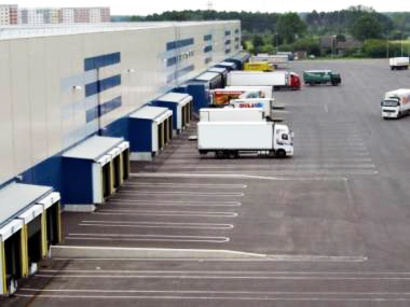China-Central Asia logistics park, new step towards modern Silk Road

By Aynur Karimova
The China-Central Asia logistics park, the foundation of which was laid by China and five Central Asian countries on June 16, will become a new step towards the realization of China's grand multibillion-dollar Silk Road project.
The logistics park will be jointly constructed by Rizhao Port Group and enterprises from Kazakhstan, Kyrgyzstan, Tajikistan, Uzbekistan, and Turkmenistan in Rizhao city in China's Shandong Province.
The cost of constructing the park will reach 60 billion yuan (approximately $9.67 billion).
The logistics park, which will cover an area of 120,000 square meters will provide services in the field of duty-free warehousing, international logistics, transit, import, export and transit trade, etc.
"As a key city of the Silk Road Economic Belt and 21st Century Maritime Silk Road, Rizhao will actively embrace the 'Belt and Road' initiative and seize the opportunity to further expand its opening-up and broaden international cooperation channels," Yang Jun, Party chief of Rizhao, told local Chinese media.
The Silk Road Economic Belt, proposed by Chinese President Xi Jinping, aims to bring together Asia and Europe with closer trade and cultural ties.
Centuries ago, it would take months for caravans of camels and horses from China to reach Europe across the sun-scorched steppes and deserts of Central Asia to exchange silk for medicines, perfumes and precious stones.
Now, thanks to the land route running from China to Europe through the Central Asian region, it takes just 15 days for trains carrying containers with electronic goods, construction materials, and other cargo to cover the 10,800-kilometer route from Chongqing in southwest China to Duisburg in Germany's industrial Ruhr region.
The seriousness of China’s intentions to promote its Silk Road project has been underscored by a series of visits by Xi Jinping to each of the Central Asian states, where he voiced his commitment to invest $40 billion into the region’s infrastructure.
An interactive map published in the Chinese state media outlet, Xinhua, shows Central Asia at the core of the proposed Silk Road project, which runs from the Khorgos economic zone on the Chinese-Kazakh border, through Kyrgyzstan and Tajikistan, before covering Uzbekistan and Iran.
Rizhao, important part of Silk Road
Located at the southeastern end of Shandong Peninsula, Rizhao is considered an important part of the overland modern-day Silk Road. It also acts as a transit point between the new land and maritime Silk Road and is a significant seaport that connects China to Central Asia.
"Such unique geographical advantages have greatly fueled the development of the city and given it huge potential to promote trade with countries along the new land and maritime Silk Road," Yang said.
Local government statistics show that the foreign trade between the city and countries along the modern Silk Road reached $7.66 billion.
With shipping routes connecting to more than 100 countries and regions, Rizhao port has become an important international logistics hub for container shipping, bulk cargo, iron ore and crude oil.
Rizhao plans to further improve its trade channels and facilities to become an all-round bridgehead for land, sea and air transport and trade. It has built a direct route for rail freight from Rizhao to Central Asia and Europe. An airport in the city is due to come into service by the end of the year.
"With these efforts, we hope to make the city not only a key transportation hub, but also a trade, logistics, financial and leisure-tourism center along the new land and maritime Silk Road," said Yang.
China's economic influence in Central Asia has grown tremendously in the last decade in terms of regional trade. It has made deals worth tens of billions of dollars with Kazakhstan, Uzbekistan and Turkmenistan.
China's new policy demonstrates the willingness of this country's leadership to advance its vision of regional integration. Currently, the country's main foreign policy is focusing on neighborhood diplomacy. So, the Silk Road initiative is a milestone in Beijing's new foreign policy direction.
--
Aynur Karimova is AzerNews’ staff journalist, follow her on
Twitter: @Aynur_Karimova
Follow us on Twitter @AzerNewsAz
Here we are to serve you with news right now. It does not cost much, but worth your attention.
Choose to support open, independent, quality journalism and subscribe on a monthly basis.
By subscribing to our online newspaper, you can have full digital access to all news, analysis, and much more.
You can also follow AzerNEWS on Twitter @AzerNewsAz or Facebook @AzerNewsNewspaper
Thank you!
